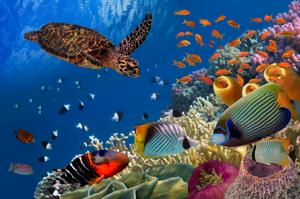Large Marine Ecosystems Approach, An Essential Management and Partnership Tool for Achieving SDG14

Time: 18:30 - 19:45 Venue: Conference Room 12
SDG14 is one of the most ambitious of the 17 SDGs particularly in terms of the accelerated time frames for achieving several of the targets. Successful implementation of SDG14 requires replication and rapid scaling up of proven strategic approaches that can deliver on one or more SDG14 targets. Drawing from the LME experience, this interactive side event will first, offer a brief introduction to the LME portfolio in the context of SDG14 (and other associated SDGs), highlighting such proven approaches that have succeeded in reversing large scale dead zones, moved global tuna stocks towards sustainability, reduced the impacts of shipping on the marine environment, and introduced integrated, ecosystem-based approaches to sustainable ocean and coastal management at both local and multi-country scales.
The first, opening, segment of the session will present an overview of where we stand with the LMEs today, how it links to existing frameworks and why this approach can be useful to deal with the ocean issues. The second, technical, segment of the session will focus on the SDG14 targets themselves, and how they can be achieved in the respective LME partnerships across the globe. It will start with an inspirational keynote speech defining the concept of LME and charting its future, to be continued with a facilitated and interactive dialogue featuring LME practitioners from various regions and agencies as well as the audience itself. Each discussant will focus on a collective LME response to SDG14 targets framed with examples from their specific context.
The goal will be to engage all session participants in formulating actionable recommendations to further guide actors in the global LME partnership forward on SDG14. Finally, in support of the Ocean Conference Partnership Dialogues, the session will also highlight new LME partnership opportunities emerging in the period leading up to 2030.
Speakers/Presenters
Opening Comments:
Didier Dogley, Minister of the Environment, Seychelles
Vladimir Ryabinin, Intergovernmental Oceanographic Commission (IOC) of UNESCO, Executive Secretary
Interview Panel:
Facilitator: Vladimir Mamaev
Hashali Hamukuaya, Executive Director, Benguela Current Commission, Namibia
Christian Severin, Global Environment Facility, Senior Environmental Specialist
Kenneth Sherman, National Oceanic and Atmospheric Administration, United States
Francisco Arias, INVEMAR (Caribbean Sea Large Marine Ecosystem), Colombia
Cristina Variatakis, Barcelona Convention Bureau, Mediterranean Sea Large Marine Ecosystem (tbc)
[Country Stakeholder], Bay of Bengal Large Marine Ecosystem or Canary Current Large Marine Ecosystem
Open Questions
Closing Summary:
Ivica Trumbic, GEF LME:LEARN PCU, Chief Technical Advisor

























